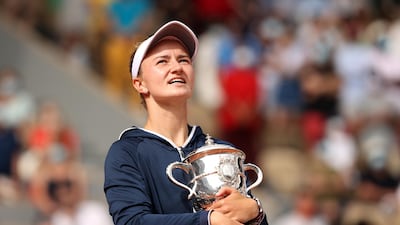As far as Czech tennis role models go, Barbora Krejcikova has the support of some pretty heavy hitters, both in person and in spirit.
Inside Court Philippe Chatrier on Saturday, cheering her on during the French Open final, were Martina Navratilova - the Czech-American who amassed 59 Grand Slam titles across all formats - and Jan Kodes, a three-time major winner in the 1970s.
But there is another Czech tennis hero who has had a far more profound influence on Krejcikova - as a player and a human being.
Jana Novotna was an immensely successful and popular player in the 1990s, winning the Wimbledon singles title in 1998 and 11 doubles Grand Slams. A former world No 2, Novotna won 104 titles across singles and doubles and was adored by tennis fans the world over.
Imagine, then, the courage it took for an 18-year-old Krejcikova to visit this giant of Czech sport at her house and ask her to be her coach. Novotna, who saw something special in the teenager, duly accepted and the pair worked together until Novotna's battle against cancer.
Novotna died in November 2017 at the age of 49 but her role as Krejcikova's mentor and inspiration continues to endure.
"I was going through a really hard time when Jana passed away, I was with her most of the time. Her last words were pretty much 'just enjoy it and try to win a Grand Slam'," Krejcikova said.
On Saturday evening in Paris, Novotna's last words to Krejcikova came true.
In a tense final against Russia's Anastasia Pavlyuchenkova, Krejcikova emerged victorious 6-1, 2-6, 6-4 to win her first Grand Slam singles title.
Pointing to the sky during the trophy ceremony, where she was accompanied on stage by Navratilova, Krejcikova said: "I know from somewhere she is looking after me and all this what happened in the last two weeks is pretty much because she is looking after me from up there.
"It is amazing I had the chance to meet her and she was an inspiration. I hope she is really happy and I am extremely happy."
Krejcikova has for some time been on track to emulate Novotna's success on the doubles circuit, having won five Grand Slam doubles titles (two women, three mixed). Indeed, she has the chance on Sunday to become only the second player after Mary Pierce in 2000 to win the Roland Garros double when she joins compatriot Katerina Siniakova in the doubles final.
But it has been her vast improvement in singles over the past year that suggests she can be a major force across all formats. Krejcikova reached the final in Dubai in March before claiming her maiden WTA Tour singles title at Strasbourg, the week before Roland Garros.
Perhaps the most visible impression Novotna has made on Krejcikova as a player has been her composure and mental toughness.
Throughout her campaign in Paris, Krejcikova has stared down adversity and kept her calm even as the tension climbed and the crowd reached fever pitch.
When she dropped serve in the first game of the match, her ability to shrug it off and respond immediately saw her win six straight games to win the set.
Pavlyuchenkova fought back with some impressive power hitting to take the second set, but that would not faze Krejcikova, who claimed the all-important break in the seventh game and sealed the championship on her fourth match point.
Even after clinching the most important win of her career, there was no dramatic collapse to the ground or floods of tears; instead the arms were raised and a subtle smile.
That steely focus will hold Krejcikova in good stead as she continues on a tennis journey that will look a lot different now that she's a Grand Slam champion. Entering Roland Garros ranked world No 33, Krejcikova will now enter the top 20 for the first time at No 15.
Now among the stars of the WTA Tour, Krejcikova can always rely on Novotna to keep her grounded.
"She always told me, 'it doesn't matter how many titles you win, you always have to say hello, please, and thank you'", Krejcikova said. "I took all of this on board because this is what she was doing. She was a great athlete and still very humble, so I want to be the same as her."

